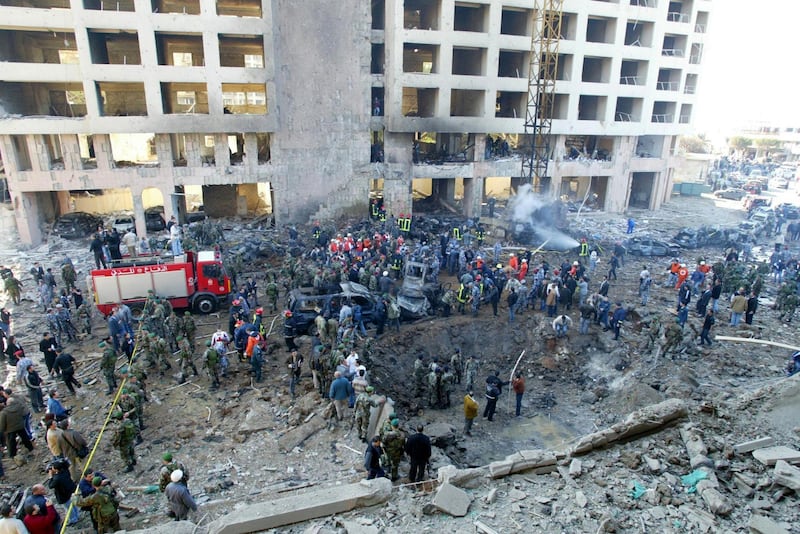More than 12 years after the assassination of Lebanese former prime minister Rafik Hariri, prosecutors in the Special Tribunal for Lebanon could wrap up their case this week.
The tribunal, taking place in The Hague, is intended to determine who was responsible for the bombing that killed Hariri in 2005 along with eight of his bodyguards and 13 bystanders.
The assassination has heavily influenced Lebanese politics in the last 12 years, perhaps more than any other single event. In the months after Hariri’s murder, massive protests against the Syrian government’s 29-year occupation of Lebanon prompted the Syrian military to withdraw. The event has become known as the Cedar Revolution, and it also divided Lebanon’s political parties into pro- and anti-Syrian factions that endure to this day.
Hariri — a fierce critic of Syria — was prime minister from 1992 to 1998 and again from 2000 to 2004. Many Lebanese believe Syrian president Bashar Al Assad ordered his assassination to prevent Hariri from being elected to a third term.
In 2011, Lebanese politics was rocked when five men — Hussein Hassan Oneissi, Salim Jamil Ayyash, Assad Hassan Sabra, Hassan Habib Merhi and Mustafa Amine Badreddine — were indicted on charges of murder and terrorism. The five are all believed to be, or to have been, high-ranking members of Hizbollah, the Lebanese political party and militia that has maintained an alliance with the Syrian government since its creation in the early 1980s. All five are being tried in absentia.
Saad Hariri, the son of Rafik Hariri, followed in his father’s footsteps as prime minister in 2009. But his term ended when Hizbollah-affiliated cabinet ministers withdrew from the government in 2011 after Mr Hariri refused to reject the special tribunal's indictments. At the time, Hizbollah leader Hassan Nasrallah promised that no member of his party would be arrested, and Lebanese authorities have until now declined to make any attempt to do so.
"No Lebanese government will be able to make any arrests whether in 30 days, 30 years or even 300 years," he said after the indictments were announced.
Hizbollah’s press office declined to provide further comment on the special tribunal, as it regards its proceedings as “illegitimate”. Mr Nasrallah publicly reiterated his stance as recently as last year.
But political calculations in Lebanon have changed vastly since 2011. Earlier this year, Saad Hariri, who was elected to a second term as prime minister in 2016, found himself praising Hizbollah and its role in helping to end the presence of ISIL and Al Qaeda-linked militant groups in northern Lebanon. Lebanon effectively has a consensus government and the trial takes place mostly in the background, at least for now.
“Nobody cares anymore,” said Liliane Bou Raad, who was injured in the explosion and travelled to The Hague last month to testify for the prosecution.
“At first, all of the TV stations covered it, now it is only Future TV,” she said, referring to the Lebanese channel Rafik Hariri founded in 1993.
The UN’s investigation into the case began in 2007, and the tribunal itself was established in 2009. It could easily continue past the end of 2018, said Wajed Ramadan, a spokeswoman for the special tribunal. She said the proceedings cost about 60 million euros (Dh260m) each year. The cost is split between Lebanon and international donors.
There are no time restrictions on the lawyers to present their cases, and Ms Ramadan said the amount of time the trial portion of the tribunal has taken so far was not out of the ordinary.
“I know for the general public it’s taking a long time, but for the number of accused, the trial is within the normal time frame of other international tribunals,” she said.
One of the only remaining public reminders of that day is a billboard, erected 12 years ago, on the corner of Army and Fakhreddine streets, where Future TV has its offices. It says “era of justice” and features a picture of Rafik Hariri.
The red digital display that initially counted the days that had passed since his assassination only went up to 999, an indicator that Hariri supporters never thought justice would be slow. That display has since been replaced with a new counter, one marking the days since the beginning of the prosecution of the five men indicted for Hariri’s murder. It has four digits.
Even if many of Lebanon’s citizens have forgotten, for others it is an impossibility. Ihsan Fayad, the widow of Talal Nasser, one of Rafik Hariri’s bodyguards, travelled to The Hague last month to testify.
“It was difficult but at the same time, you must think of it from two perspectives,” Ms Fayad said. “It is very good for us to communicate what we have suffered, so that all the people see it and hear about it. The difficult thing is that we experience living those moments again.”
Rafik Hariri’s supporters credit him with helping rebuild the country after the end of its 15-year civil war in 1990, and his assassination and others that followed have become potent examples of the Lebanese government’s weakness in the wake of a conflict in which no one was ever held accountable for their crimes.
“The most important thing they must remember about that day is that there is one person, a man of the state who isn't only specific to Lebanon, but an international figure who lifted Lebanon from war, helped all the people and who was killed in broad daylight in the middle of Beirut with a huge amount of explosives,” Ms Fayad said. “This must not be forgotten.”
Underscoring the political sensitivities, Ms Fayad, Ms Bou Raad and another victim who spoke with The National refused to even name those indicted, let alone speculate about their culpability.
“I will wait to see what the court's decision will be, knowing that there were many things that happened before the assassination that help indicate who benefited from assassinating Hariri,” Ms Fayad said, referring to reports that Mr Assad had personally threatened Hariri during a meeting in Damascus six months before he was killed.
____________________
Read more:
[ Parents of assassinated police captain still hoping for justice ]
[ Badreddine’s death promotes many theories ]
[ Hizbollah strengthens its position in Lebanon with military successes ]
____________________
The case has provided no shortage of intrigue, particularly a number of assassinations and deaths in the years since that many suspect are linked to the investigation.
They include Mustafa Amine Badreddine, one of the five defendants, who was killed last year in Syria by an explosion near Damascus airport. Though the Israeli government had previously attempted to assassinate Badreddine, Israeli general Gadi Eisenkot suggested earlier this year that Hizbollah officials ordered his death because he had been called to testify before the tribunal.
Hizbollah blamed Badreddine’s death on shelling by rebels fighting the Syrian government.
Wissam Eid, a Lebanese police officer who first uncovered clusters of mobile phones that linked the defendants to the assassination, was killed by a bomb along with a bodyguard in 2008.
The tribunal is also investigating the 2005 assassination of Lebanese politician George Hawi, as well as attacks on two other Lebanese politicians the same year that the tribunal believes are linked to Rafik Hariri’s killing. The tribunal has yet to issue any indictments in those cases.
Though the divisions the trial created have faded into the background for now, that could change whenever a verdict is reached.
“In the case of a strong verdict based on strong evidence pointing fingers at Hizbollah operatives, it will be interesting to see if this mutual accommodation will survive,” said Randa Slim, the director of the Track II Dialogues initiative at The Middle East Institute in Washington.
Ms Slim also said the proceedings were an important step in attempting to set a precedent for future acts of violence.
“The court provides a strong argument for the rule of law and that killers, even state-sponsored ones, should not be allowed to act with impunity. This principle needs to be upheld especially now as the international community is getting ready to let Mr Assad escape punishment for the crimes he committed against Syrians.” she added, referring to Syria’s ongoing civil war that has claimed nearly half a million lives.
Saad Hariri himself said as much more than a decade ago, and nearly five years before the beginning of the war in Syria.
"There is a country and a regime that has been pounding at Lebanon with assassinations and explosions after explosions and killings after killings, which have been going on for over 30 years," he told Time magazine in 2007. "It is important to punish those who commit these crimes, for them to understand they don't have a license to kill.
“And if this tribunal doesn't happen, then the international community will have given a license to kill to the regime of Bashar Al Assad and to Bashar Al Assad himself."





